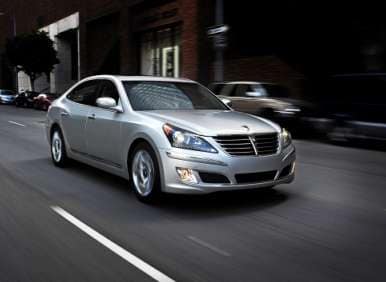Recent Articles
Popular Makes
Body Types
2013 Hyundai Equus Road Test and Review
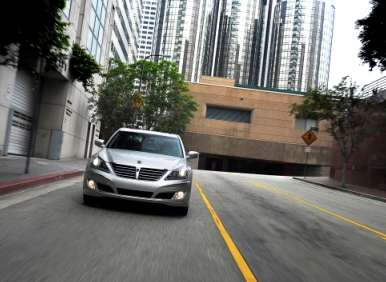
Anyone paying attention to the ministrations of today’s automotive scene knows Hyundai is currently enjoying what scholars refer to as a golden period. With but one exception (that whole 40 mpg debacle), over the past few years everything the company has done in North America has worked—really well. From its offer to buy back cars if customers lost their jobs, to its 10-year/100,000 mile warranty, Hyundai has proven it’s on the side of its customers and will stop at nothing to ensure their satisfaction.
The success of these initiatives has been accompanied by a steady broadening of the company’s product portfolio, giving Hyundai a competitive automobile in nearly every segment of the mainstream automotive marketplace. From its quirky—but cool—Veloster “reverse halo car”, all the way up into the rarefied ranks of full-size luxury automobiles, the Hyundai brand has expanded to fill nearly every potential category.
Anyone whose familiarity with Hyundai ends with the company’s first North American offering, the Excel, would be absolutely stunned by the brand’s product portfolio today. With that said, probably the most jaw-dropping product of all would be the company’s flagship large luxury sedan, Equus.
Well executed, the 2013 Hyundai Equus is solidly in possession of that indefinable quality known as presence. The look of the car clearly states its maker’s intention. And, while many may decry the big Hyundai’s styling as derivative of various and sundry Mercedes-Benz, Lexus and BMW products, the fact of the matter is the Hyundai is quite the desirable auto nonetheless.
2013 Hyundai Equus Road Test & Review: Models & Prices
Since its introduction in 2011, Hyundai has offered Equus in two configurations: Equus Signature and Equus Ultimate. Equus Signature pricing starts at $59,250, plus $920 in destination charges. Equus Ultimate starts at $66,250, plus the $920 destination charge.
Actual base price for each (including destination — don’t worry, we’re not going to make you do the math) is $60,170 for Equus Signature and $67,170 for Equus Ultimate.
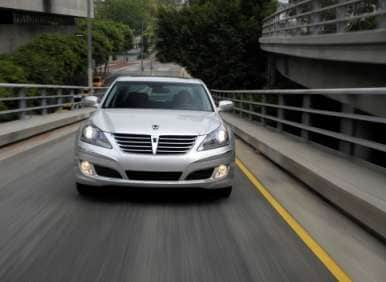
2013 Hyundai Equus Road Test & Review: Design
The overall look of the Hyundai Equus, while not exactly groundbreaking by any stretch of the imagination, is quite handsome just the same. Rather than forge its own path in terms of the look of the car, Hyundai adopted styling cues from all the other large cars in the class. So while the Equus does indeed have presence, it doesn’t really stand out as being particularly distinctive or exclusive.
The face of the car is punctuated by the expected-for-this-class-of-car large chromed grille treatment characterized primarily by eye-catching shiny horizontal slats. The jeweled headlamps accentuate the grille quite nicely however. To keep clutter to a minimum, the Hyundai’s LED turn signals are mounted inside the housings of the HID headlamps. White LED positioning lamps are employed for daytime running illumination. Completing the look of the front end is a set of lower air intakes, intimating the performance capability of the Equus.
At the rear, the confident taillight configuration, along with a robust shoulder treatment implies strength and solidity. Asymmetrical exhaust tips integrated into the lower valance—along with a set of rear LED turn signal indicators complete the treatment.
The side silhouette’s character lines accentuate the fenders and give the car the appearance of flowing along, even when it is stationary. They also make the Equus look a bit more compact than it actually is. The satin chrome trim around the windows adds a bit of luster, without introducing a crass blingishness to the Hyundai.
Overall, the lines of the Equus are an interesting expression of Hyundai’s current fluidic sculpture styling philosophy. However, unlike the other new Hyundai models employing the design language, rather than looking fresh and original on the Equus, it looks like an amalgamation of transplanted design cues from all of the other luxury cars out there.
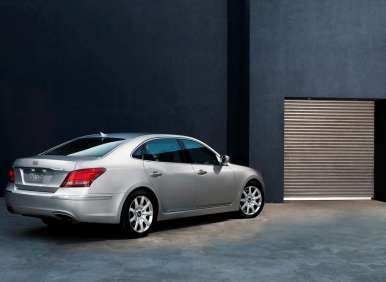
2013 Hyundai Equus Road Test & Review: Comfort & Cargo
By far though, the nicest aspect of the Equus is its interior. Genuine wood and lightly processed leather are the primary players. The Hyundai’s passenger compartment absolutely reeks of quality and is a highly comfortable place from which to watch the world go by. Ergonomically, the interior is thoughtfully laid out and the look of the materials employed admirably reflects the category the Equus is designed to function within.
Further, all the seats are remarkably comfortable and would very easily sustain their occupants over a full day of long distance travel. First-class-style headrests for both rear seats contain adjustable wings that can be situated to provide perfect comfort and support for napping or relaxation on the move.
Nicely configured for chauffeur operation, the rear compartment offers the option of a set of heated and cooled bucket seats, as well as control over the entertainment and climate control functions (take our advice, go for them, they are so choice!). The right rear seat is lifted directly from an intercontinental airliner’s business class. The throne-like accommodation provides full reclining functions, a footrest, and 50/50 massages with heat and vibration for relaxation therapy during extended cruising. A dedicated remote control unit dictates all of the seat’s functions.
The Equus offers 16.7 cubic feet of cargo capacity, a generously sized glovebox with the owner’s manual on an iPad, map pockets in the front seatbacks, a deep storage well in the center console, and commodious storage bins in all four doors.
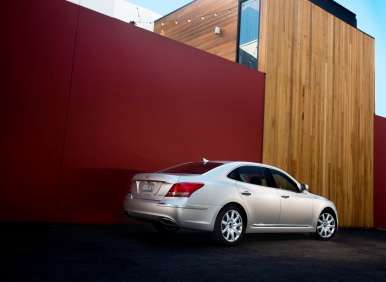
2013 Hyundai Equus Road Test & Review: Features & Controls
The Hyundai’s switchgear is nicely sized, well labeled and logically positioned. After only a few minutes behind the wheel, you’ll know exactly where everything is and what it does. A large video monitor dominates the center stack, and, as is de rigueur in a modern luxury car, secondary functions are accessed and executed via a rotary controller just aft of the shift lever. Easy to navigate, the system quickly becomes second nature.
Seat functions are manipulated via buttons on the door, arranged, not coincidentally, in the shape of a seat. Beautifully executed cabinetry separates the two rear seats. A refrigerator is also offered as an option.
The Equus Signature feature set includes electronically controlled air suspension with continuous damping control, Vehicle Stability Management (VSM) with pre-collision warning, Smart Cruise Control, HID headlamps, a front and rear parking assistance system with rearview camera, premium leather seating, a Microfiber suede headliner, driver seat massage, heated and cooled front seats, a heated wood and leather steering wheel, and numerous other premium technologies and features.
Entertainment is sourced from a 608-watt Lexicon audio system with 17 speakers.
Living up to its name, Equus Ultimate adds to all of the above a forward-view parking and cornering camera; a power trunk lid; cooled, reclining rear seats with powered headrests massage and leg support; a refrigerator, and a rear seat entertainment system.
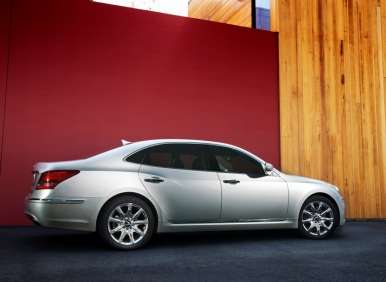
2013 Hyundai Equus Road Test & Review: Safety & Ratings
Hyundai’s product planners have equipped Equus with a strong suite of active and passive safety features. Electronic stability control (ESC), nine airbags, electronic active front head restraints, a lane departure warning system, and smart cruise control lead the list of safety kit. Equus is also fitted with a vehicle stability management system, which leverages ESC, the electronic parking brake, smart cruise control, and the seatbelt tensioning system to optimize the safety of the occupants of the Hyundai.
Equus’ total of nine airbags include advanced dual front airbags, front and rear seat-mounted side-impact airbags, roof-mounted side curtain airbags for both front and rear outboard seat occupants, and a driver’s knee airbag.
The optional camera located on the front grille and the standard camera on the rear decklid help detect the proximity of objects when parking the Equus, preventing both accidents and minor ding-related repair costs. Brake assist and electronic brake-force distribution support the Hyundai’s four-wheel anti-lock disc brakes.
The Insurance Institute For Highway Safety lists Equus as a top safety pick.
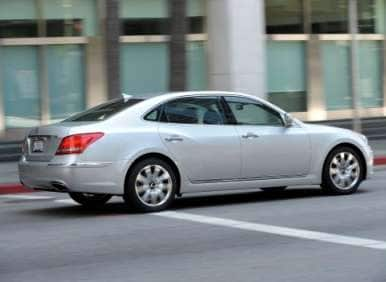
2013 Hyundai Equus Road Test & Review: Engine/Fuel Economy
Motive force for the 2013 Hyundai Equus is supplied via a 429-horsepower, 5.0-liter V8 engine, capable of generating 376 ft.-lbs. of torque. The engine is smooth, emits a mellifluous aural signature and accelerates the car sharply from rest—while offering lots of headroom at speed for overtaking slower traffic.
The V8’s fuel economy is quoted at 15 miles per gallon in the city, 23 on the highway and 18 overall. Fitted with octane sensors, the V8 engine will run well on either regular or premium fuel.
Hyundai developed its own eight-speed automatic transmission to route the engine’s power to the rear wheels of the Equus. The gearbox shifts crisply and offers a manual mode—enabling the driver to take complete control of its operation if so desired.
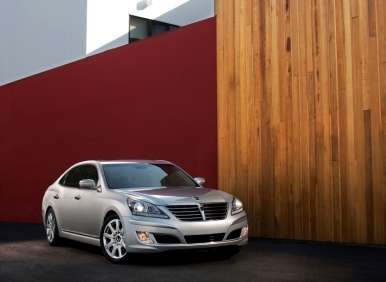
2013 Hyundai Equus Road Test & Review: Driving Impressions
Given the Hyundai’s penchant for attacking corners, that manual transmission control capability isn’t as superfluous as you might be led believe by the nature of the Hyundai’s large-ish appearance. Boasting a fast-responding electronically controlled air suspension system with continuous damping control, height adjustability, and a driver selectable sport mode, the suspension system of the Equus delivers outstanding stability at high speeds. Further, the car exhibits almost no body roll when negotiating curves, while still presenting the suppleness of ride expected from a car in this category when operated under more sedate circumstances.
The engine is both powerful and responsive. Steering is accurate if slightly devoid of road feel. You can trust your inputs to match your desires, but you won’t feel every nuance of the pavement like you do in the better German cars. The big Hyundai’s brakes are resolute in their ability to scrub off speed. They also respond readily to modulation—ensuring smooth stops with no untoward jerking of passengers.
Frankly though, as a luxury car, the Hyundai isn’t quite as quiet or smooth as its primary competition from Lexus. However, the Equus does engage the driver a bit more than the LS does. Dynamically though, in terms of sheer over the road feel and ability, the Hyundai is bested by all of the Germans as well.
Wait now, before all of this leads you to believe the Equus is a noisy, ill-driving car, keep in mind the competitive set we’re discussing here is the absolute ne plus ultra of mainstream automobiledom.
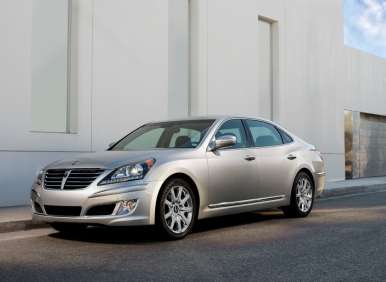
2013 Hyundai Equus Road Test & Review: Final Thoughts
All in all, the Hyundai Equus is a remarkable car, representing an excellent opportunity for its maker to have the name Hyundai credibly considered among the elite of automotive nameplates. Equus is good looking, comfortable, more than adequately powered, and amazingly well priced for what it is.
Still, in all frankness, the top cars from Cadillac, Infiniti and Lexus have more to fear from the Equus than the pinnacle German cars do. When you start talking about Deutschland’s flagships, there are a number of subtle factors to consider. While the Equus hits all the broad strokes as far as content and character, there are some features the big Germans flaunt that didn’t make the Hyundai’s spec sheet. Night vision, self-closing doors, all-wheel drive, and 12-cylinder engines—not to mention the very cachet that goes along with owning one of the Lords of the Autobahn—won’t be found at your local Hyundai dealer.
On the other hand, while we’re on the subject of your local Hyundai dealer, the company has taken great care to ensure the Equus buyer gets a first-class experience. This includes at-home vehicle demos; wherein an ambassador from one of the 200 Hyundai dealerships authorized to handle Equus will bring the car to your home for the product demonstration and test drive. After the sale, valet pickup and delivery for maintenance means you’ll never have to set foot in a Hyundai dealership if you choose to avoid doing so. This level of service surpasses even Infiniti and Lexus—arguably two of the most accommodating marques extant.
Further, for the relatively reasonable money Hyundai’s asking for the Equus, it’s very difficult to find a car of its size and equipment, with road manners to match. The 2013 Hyundai Equus, quite simply stated, is a very pleasant car to drive. For the vast majority of people shopping for a large luxury car, the Hyundai will do absolutely nothing to dissuade them for taking one home for a long term relationship.
In a nutshell, if you’re shopping in this category, the Equus definitely deserves a shot. Now, whether or not it’s exactly what you’re looking for in a large, luxurious prestige sedan—well that’s going to be up to you.
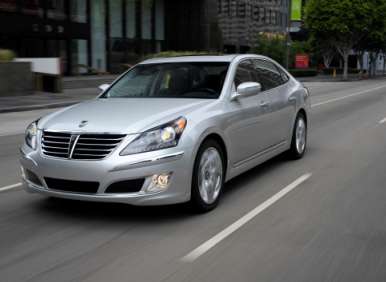
2013 Hyundai Equus Road Test & Review: Pros & Cons
• Beautiful interior
• Outstanding features for the money
• Powerful engine
• Derivative exterior styling
• Broad strokes are covered, subtle nuances are left wanting
